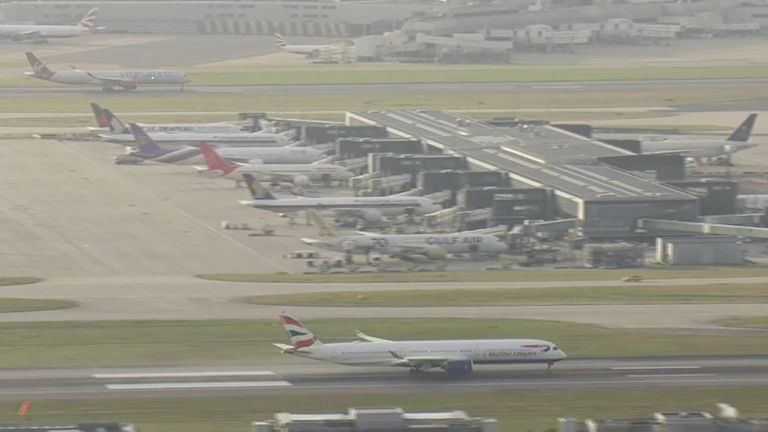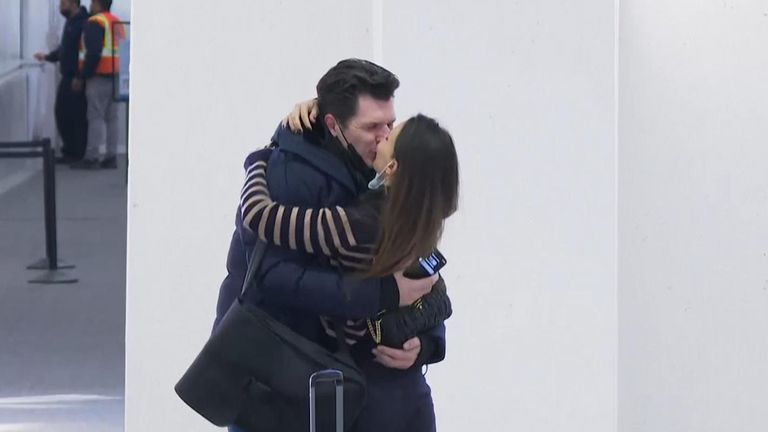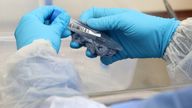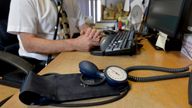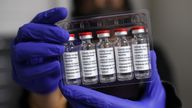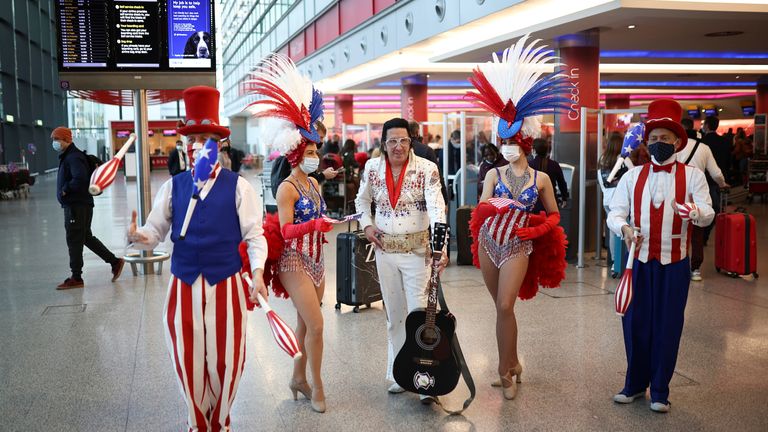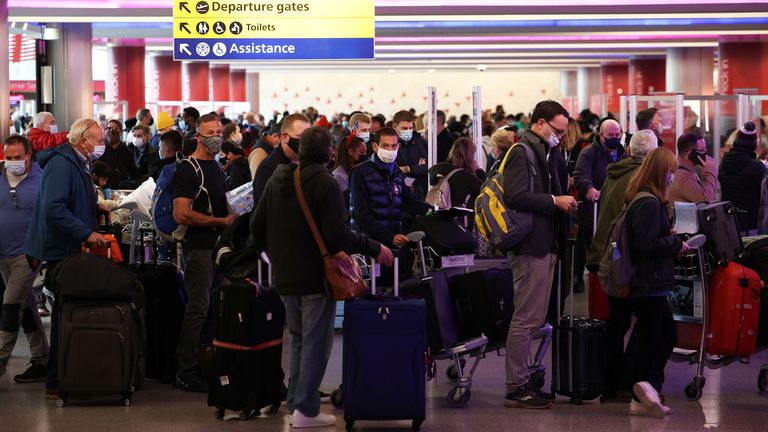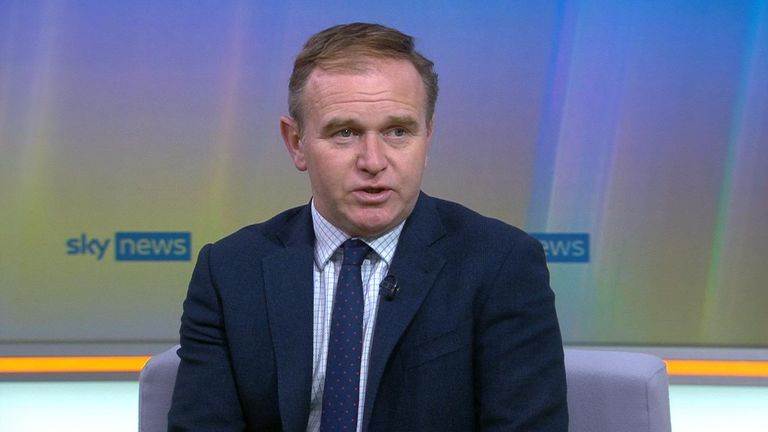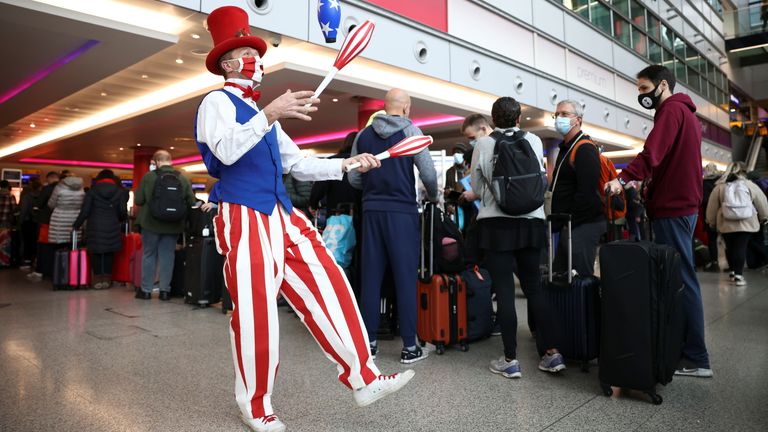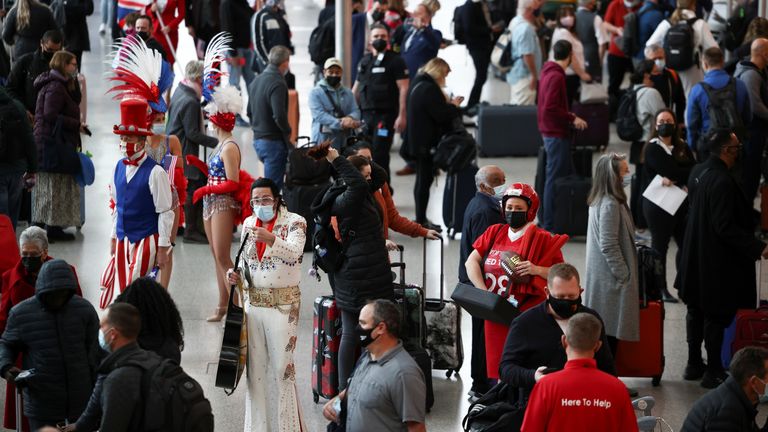Double take off at Heathrow as 'excited' passengers take advantage of US reopening borders to UK travellers
Thousands of people will jet off on transatlantic flights for long-awaited reunions bringing to an end restrictions which were introduced nearly two years ago.
Monday 8 November 2021 23:22, UK
Rival airlines British Airways and Virgin Atlantic have operated a synchronised departure from Heathrow to celebrate the end of the US travel ban for fully vaccinated passengers from the UK.
"Excited" travellers queued to check in at the airport after the lifting of the travel ban brought an end to almost two years of coronavirus restrictions on incoming travellers to the US.
The two flights took off from parallel runways at the airport in west London on Monday morning before heading to JFK in New York.
Thousands of travellers will now be able to jet off on transatlantic flights for long-awaited reunions with family and friends.
Alice Keane, who was travelling to Miami to see her sister, said at Heathrow: "Really, really exciting.
"I was meant to go just before COVID happened, and obviously it's been delayed this long, so it's really exciting to finally be able to go."
Bindiya Patel, who was going to see her young nephew in New York for the first time, said: "I think we might just start crying. We're really excited."
Christian Marcelia, 26, said he was "excited and a bit nervous" to be flying to New York to visit his girlfriend and her family.
He said: "My girlfriend lives over there, so we've been sort of long distance for two years. I'm going there to meet her family for the first time."
The US lifted restrictions from a long list of countries, including Canada and Mexico - while travellers from the EU have also been boarding flights to the US with a large number of bookings being reported in nations such as France.
"We went from zero activity to one that is similar to October 2019 levels, so before COVID," said Jerome Thomann, of Paris-based Jetset Voyages travel agency, which specialises in trips to North America.
Transport Secretary Grant Shapps said it was a "significant moment" as transatlantic travel has "long been at the heart of UK aviation".
It is the end of restrictions first imposed by former President Donald Trump at the start of the pandemic, which saw visitors banned from dozens of countries.
However, travellers must be fully jabbed and provide proof of a negative COVID-19 test taken within three days of entering the country.
Airlines have ramped up flights to meet demand, with 2,688 scheduled to operate between the UK and US this month.
This is up 21% compared to October but down 49% on pre-pandemic levels of November 2019.
British Airways chief executive Sean Doyle said the reopening of the US borders was a "moment to celebrate" after "more than 600 days of separation".
He went on: "Transatlantic connectivity is vital for the UK's economic recovery, which is why we've been calling for the safe reopening of the UK-US travel corridor for such a long time."
His counterpart at Virgin Atlantic, Shai Weiss, said: "The US has been our heartland for more than 37 years and we are simply not Virgin without the Atlantic.
"We've been steadily ramping up flying to destinations including Boston, New York, Orlando, Los Angeles and San Francisco, and we can't wait to fly our customers safely to their favourite US cities to reconnect with loved ones and colleagues."
Entry requirements
Passengers must be fully vaccinated with a COVID-19 vaccine approved for emergency use by the World Health Organisation or approved by the US Food and Drug Administration.
Accepted vaccines are: AstraZeneca, BIBP/Sinopharm, Covishield, Janssen, Moderna, Pfizer-BioNTech and Sinovac.
People who received a full series of a vaccine - not a placebo - during trials for AstraZeneca or Novavax are also considered vaccinated.
The US will accept the NHS COVID-19 pass as sufficient proof.
Travellers must have a negative COVID-19 test within three days of their flight departure.
Follow the Daily podcast on Apple Podcasts, Google Podcasts, Spotify, Spreaker
The only exceptions to the vaccination requirements are US citizens, US nationals, US lawful permanent residents and children under the age of 18.
Exempt passengers must show a negative coronavirus test taken one day prior, or documentation of having recovered from COVID-19 in the last three months.
After entering the US
Fully vaccinated travellers do not have to quarantine, but they are recommended to take a test within the first three to five days of arrival - unless they have documentation showing they have recovered from the virus within the last three months.
Children are also exempt from quarantine but must take a test within three to five days.
Those allowed to enter the US unvaccinated must take a test within three to five days and self-quarantine for seven days after arrival.
Anyone staying longer than 60 days must become fully vaccinated unless medically exempt or too young.
